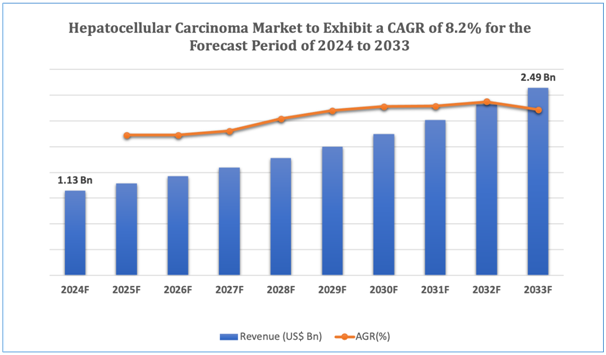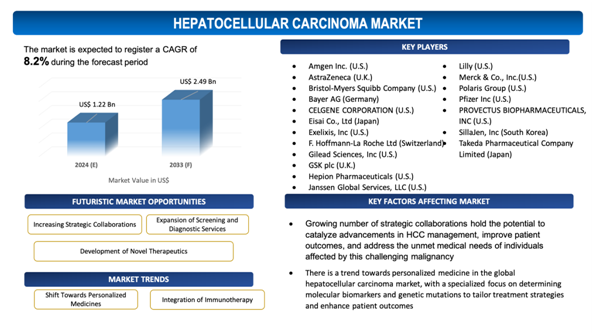Hepatocellular Carcinoma Market Overview
The global Hepatocellular Carcinoma market is estimated to be worth over USD 2.49 Bn in 2033 and is expected to grow at CAGR of 8.2% during the forecast period (2024-2033). Hepatocellular carcinoma (HCC) represents as the primary form of liver cancer across the globe, portraying a significant public health challenge attributing to its increased incidence rates and substantial mortality burden. Most commonly springing within the backdrop of chronic liver ailments, comprising liver cirrhosis, hepatitis B and C infections, non-alcoholic fatty liver disease (NAFLD), and alcohol-associated liver disease, HCC poses a complicated and multifarious clinical panorama. The global market for HCC surrounds a disparaterange of sectors, comprisingtherapeutics, diagnostics, and supportive care, all focused at addressing the complicated challenges associated with managing this aggressive malignancy.
Diagnostic modalities hold a crucial role in the early detection and staging of HCC. Technologies such as computed tomography (CT), ultrasound, and magnetic resonance imaging (MRI) allow accurate diagnosis and characterization of liver lesions, supporting timely intervention. In addition, serological tests for biomarkers like alpha-fetoprotein (AFP) and imaging-based scoring systems contribute to risk stratification and disease monitoring, assisting clinicians in treatment decision-making.
Therapeutic interventions for HCC encircles a gamut of approaches, scaling from curative intent strategies such as surgical resection and liver transplantation to locoregional therapies like transarterial chemoembolization, radiofrequency ablation, and radioembolization. Systemic treatments, involving targeted therapies and immunotherapy, have also surfaced as valuable alternatives for patients with advanced disease. Palliative care measures hold an integral role in symptom management and enhancing the quality of life for patients facing advanced-stage HCC.
Notwithstanding with the notable advancements in HCC management, substantial challenges persist. Achieving early diagnosis remains a major hurdle, specifically in regions with limited healthcare resources. Alongside, optimizing treatment outcomes and addressing disparities in access to care represent ongoing priorities within the global HCC landscape. Persistent research, innovation, and collaborative efforts are essential to advance prevention, early detection, and treatment strategies, ultimately reducing the global burden of hepatocellular carcinoma.
Figure 1. Hepatocellular Carcinoma: Market Size

Get more details on this report - Request Free Sample
Key Market Insights &Current Market Landscape:
Hepatocellular carcinoma remains a dangerousillness with poor prognosis in patients with unresectable cancer. Trans-arterial chemoembolization is the major locoregional therapy for intermediate-stage hepatocellular carcinoma, with an approximate median overall survival of less than two years. For nearly a decade, sorafenib has been the only conventional systemic treatment for metastatic disease or tumors which progress or are considered inappropriate for locoregional therapy. Significant breakthroughs have been made in the recent years in the management of hepatocellular carcinoma, particularly in medical therapies for advanced disease.
Trans-arterial chemoembolization (TACE) is the most widespread form of intra-arterial therapy and is the established first-line treatment for intermediate-stage HCC. It includes arterial catheterization, generally via the femoral artery, to cannulate the hepatic arterial branches. TACE with drug-eluting beads (DEB-TACE) and trans-arterial radio-embolization (TARE) are alternative intra-arterial locoregional therapies for HCC. In DEB-TACE, cytotoxin-carrying microspheres are used instead of lipiodol, enabling simultaneous delivery of chemotherapeutic and embolization agents. The potential benefit of DEB-TACE is more continued and selective drug delivery to the tumor with less systemic absorption and toxicity.
Market Dynamics
Market Drivers
Rising Approval of New Drugs
The increasing approval of new drugs represents an essential market driver for the global hepatocellular carcinoma (HCC) market. With HCC being a primary cause of cancer-associated mortality across the world and its prevalence on the surge, the approval of novel therapeutics provides immense potential in addressing the unmet medical needs related to this aggressive malignancy. Pharmaceutical firms are amplifying their research and development efforts to develop advanced treatments targeting different aspects of HCC pathogenesis, comprising tumor growth, angiogenesis, and immune modulation.
The advent of new drugs, such as targeted therapies and immunotherapies, diversifies the treatment alternatives available for HCC patients, offering clinicians with more effective tools for administering the disease. Along with that, the approval of new drugs fosters competition within the market, potentially leading to lower treatment costs and improved accessibility for patients. By addressing the evolving needs of patients and healthcare providers, the increasing approvals of new drugs drive innovation, supporting advancements in HCC management, and contribute to the continuing efforts to mitigate the global burden of this challenging disease.
Market Restraints
With regard to numerous advantages of Hepatocellular Carcinoma, the market faces several challenges due to the unique characteristics and requirements associated with them. Some of the key market challenges include:
- Limited Treatment Options: The limited availability of effective treatment alternatives for advanced-stage hepatocellular carcinoma (HCC), specifically in cases of disease progression or treatment resistance, presents a significant restraint on the market, leading to suboptimal outcomes for patients.
- High Development Costs: The increased costs related to the research and development of novel therapeutics and diagnostic technologies for hepatocellular carcinoma contribute to the financial strain on pharmaceutical companies and healthcare systems, potentially impeding investment in innovative solutions and limiting accessibility for patients.
Market Opportunities
Increasing Strategic Collaborations
By leveraging the complementary expertise, resources, and capabilities of several stakeholders, comprising pharmaceutical firms, biotechnology companies, academic institutions, and healthcare providers, strategic collaborations can propel the pace of innovation and foster the development of novel therapeutics, diagnostic tools, and treatment strategies for HCC. Collaborative efforts allow the sharing of knowledge, data, and research findings, supporting a more comprehensive understanding of HCC pathogenesis and disease mechanisms. In addition to that, partnerships between industry players and academic research institutions can speed up the translation of preclinical discoveries into clinical applications, resultingin the discovery and validation of promising drug targets and biomarkers. In addition to that, collaborations between pharmaceutical firms and regulatory agencies align the drug development process, promoting regulatory approvals and market access for new HCC treatments. Overall, growing number of strategic collaborations hold the potential to catalyze advancements in HCC management, improve patient outcomes, and address the unmet medical needs of individuals affected by this challenging malignancy.
Market Trends
- Shift Towards Personalized Medicine: There is a trend towards personalized medicine in the global hepatocellular carcinoma market, with a specialized focus on determining molecular biomarkers and genetic mutations to tailor treatment strategies and enhance patient outcomes.
- Integration of Immunotherapy: There is an increasing trend towards the integration of immunotherapy in the treatment paradigm for hepatocellular carcinoma, with the development of novel immune checkpoint inhibitors and combination regimens focused at harnessing the body's immune response to target and eradicate cancer cells.

Get more details on this report - Request Free Sample
Hepatocellular Carcinoma Market: Key Segments
By Drug Class
- PD-1/PD-L1 Inhibitors
- Atezolizumab (Tecentriq)
- Avelumab (Bavencio)
- Durvalumab (Imfinzi)
- Tyrosine Kinase Inhibitors
- Gefitinib
- Erlotinib
- Sorafenib
- Treatment
By Route of Administration
- Oral
- Injectable
- Others
By End User
- Hospitals
- Homecare
- Specialty Clinics
- Others
By Distribution Channel
- Hospital Pharmacy
- Online Pharmacy
- Retail Pharmacy
By Key Geographical Regions
- North America
- Europe
- Asia-Pacific
- Middle East and Africa
- South America
Hepatocellular Carcinoma Market: Regional Analysis
North America dominates the market due to the presence of key manufacturers of the product and treatment processes.Asia-Pacific has witnessed the highest growth for hepatocellular carcinoma drugs market throughout the forecasted period due to the developing number of R&D activities attempted by the companies in the region to create effective treatments for treating of hepatocellular carcinoma.
Figure 4. Hepatocellular Carcinoma Market: Distribution by Region

Get more details on this report - Request Free Sample
Leading Hepatocellular Carcinoma Developers
Industry Trends and Global Forecasts, 2023-2035 report features an extensive study of the current market landscape, market size and future opportunities associated with the Hepatocellular Carcinomamarket, during the given forecast period. Further, the market report highlights the efforts of several stakeholders engaged in this rapidly emerging segment of the biopharmaceutical industry. Key takeaways of the Hepatocellular Carcinomamarket are briefly discussed below.
The report includes the list of players operating in the global Hepatocellular Carcinomamarket. Some of the key players include:
- Amgen Inc. (U.S.)
- AstraZeneca (U.K.)
- Bristol-Myers Squibb Company (U.S.)
- Bayer AG (Germany)
- CELGENE CORPORATION (U.S.)
- Eisai Co., Ltd (Japan)
- Exelixis, Inc (U.S.)
- F. Hoffmann-La Roche Ltd (Switzerland)
- Gilead Sciences, Inc (U.S.)
- GSK plc (U.K.)
- Hepion Pharmaceuticals (U.S.)
- Janssen Global Services, LLC (U.S.)
- Lilly (U.S.)
- Merck & Co., Inc.(U.S.)
- Polaris Group (U.S.)
- Pfizer Inc (U.S.)
- PROVECTUS BIOPHARMACEUTICALS, INC (U.S.)
- SillaJen, Inc (South Korea)
- Takeda Pharmaceutical Company Limited (Japan)
Recent Developments in the Hepatocellular Carcinoma Market
Several recent developments have taken place in the field of Hepatocellular Carcinoma, some of which have been outlined below. These developments, even if they took place post the release of our market report, substantiate the overall market trends that we’ve outlined in our analysis chronologically.
- On November, 2023, Terumo India, the Indian arm of Terumo Corporation, a global leader in medical technology, recently announced the launch of Occlusafe™ and LifePearl™, intended for use in the management of Liver Cancer.Hepatocellular carcinoma (HCC) is the most common type of primary liver cancer with more than 20,000 cases getting added every year in India. HCC can be treated with management approaches ranging from surgical resection to minimally invasive options.
Scope of the Report
The market report presents an in-depth analysis of the various firms / organizations that are engaged in this market, across different segments, as defined in the below table:
|
Key Report Attributes |
Details |
|
Base Year |
2023 |
|
Forecast Period |
2024-2033 |
|
CAGR (2024-2033) |
8.2% |
|
Drug Class |
|
|
Route of Administration |
|
|
End User |
|
|
Distribution Channel |
|
|
Key Geographical Regions |
|
|
Key Companies Profiled |
|
